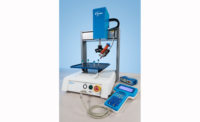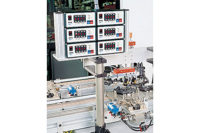During that time, PipercrossUSA has increased filter production by focusing on improving resin mixing, dispensing and automation processes. The company also has focused on ways to improve the bonding and sealing of their filter elements.
This latter challenge led Pipercross USA to meet recently with Liquid Control Ltd., a subsidiary of Fisnar Inc. that manufactures resin mixing equipment.
After consultation, PipercrossUSA installed the Liquid Control DXE60 automatic metering, mixing and dispensing system. The system features a Cartesian robot with a remote dispensing head and static mixer. It accurately meters and mixes the two-component polyurethane resin PipercrossUSA uses to bond filter elements.
The system dispenses the resin into a rectangular or square mold, and always dispenses the exact amount of material needed. If the system dispensed too much material, the active filter area would get contaminated. If the system dispensed too little material, the probability of a leak would increase.
Leaky filters are rejected during testing and inspection. Prior to automating the dispensing process, PipercrossUSA was rejecting as much as 50 percent of assembled filters.
The dispensing system also ensures that the mixed resin has a consistent viscosity through accurate ratio meteringTable Properties and temperature control. A self-correcting flow-control monitoring system provides consistent flow rates.
The PipercrossUSA filter element consists of a top and base. The base is created first. A worker positions the base mold on the robot’s work table and initiates resin dispensing. The mixer precisely dispenses the mixed resin as the head follows the profile of the base mold.
Next, the base mold is moved to a temperature-controlled carousel to cure the resin. After the base cures, the top mold is placed on the work table. The base is inserted into the top mold, resin is dispensed, and the cure process is repeated.
“Because of the programmable control and dispensing precision, we were able to refine and improve the quality of our filters,” says Adam Hughes, general manager of PipercrossUSA. “We experienced a significant cost saving [by dramatically reducing] our reject rate...and a 40 percent increase in production due to critical improvements in reliability.”
For more information on metering and mixing systems, call 973-646-5044 or visit www.fisnar.com.







